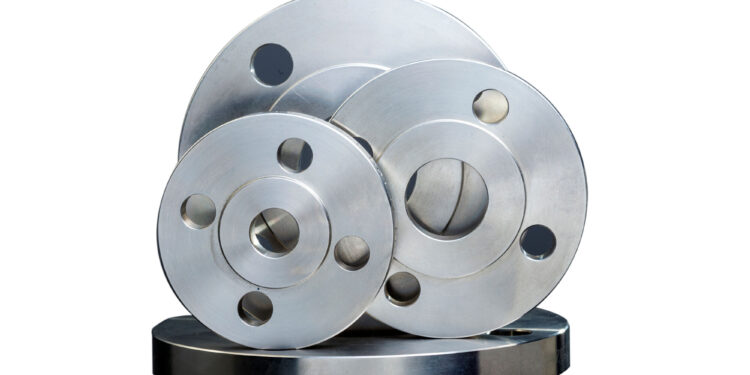In modern engineering, every component of a system plays a vital role in achieving peak performance, energy savings, and long-term reliability. Among these components, Titanium Flanges have emerged as a premium choice in industries that demand strength, corrosion resistance, and—most importantly—efficiency. Thanks to their lightweight yet durable nature, titanium flanges can greatly enhance the operational efficiency of both small-scale and large-scale systems.
This blog explores how lightweight titanium flanges improve system efficiency across industries, the unique benefits they offer, and why they are increasingly replacing heavier alternatives like carbon steel and stainless steel flanges.
What Are Titanium Flanges?
Titanium flanges are pipe fittings made from titanium alloys, used to connect pipes, valves, pumps, and other equipment. These flanges form a leak-proof seal between components and are typically bolted in place.
Titanium is a metallic element known for its high strength-to-weight ratio, excellent corrosion resistance, and ability to withstand extreme temperatures. Common grades used in flange manufacturing include:
- Grade 2 Titanium – Commercially pure titanium; excellent corrosion resistance with moderate strength.
- Grade 5 Titanium (Ti-6Al-4V) – Alloyed with aluminum and vanadium for enhanced strength and temperature resistance.
Why Weight Matters in Industrial Systems
In mechanical, chemical, or marine systems, every kilogram matters. Heavier components increase installation and operational costs and may require reinforced support structures. In contrast, lightweight materials like titanium reduce:
- System weight
- Energy consumption
- Maintenance effort
- Shipping and handling costs
This is especially critical in sectors like aerospace, marine, and offshore drilling, where reducing weight translates directly to fuel savings, safety, and overall system performance.
Key Ways Titanium Flanges Improve System Efficiency
1. Reduced Structural Load and Installation Costs
Titanium has a density of approximately 4.5 g/cm³—about 45% less than steel. Using titanium flanges instead of stainless or carbon steel drastically reduces the overall weight of piping systems.
How it helps:
- Lighter systems require less structural reinforcement.
- Easier to handle and transport.
- Reduced crane and lifting costs during installation.
- Faster assembly and reduced labor hours.
In offshore platforms or aerospace systems, where weight constraints are non-negotiable, Titanium Flanges are ideal for simplifying design and reducing costs.
2. Lower Operational Energy Use
When equipment is lighter, less energy is required to move it—whether it’s part of a vehicle, aircraft, or rotating pipeline system. Titanium flanges reduce the total load, resulting in:
- Lower fuel usage in mobile systems
- Reduced wear on moving parts
- Increased system responsiveness
Over time, this adds up to significant energy savings and less environmental impact.
3. Excellent Strength-to-Weight Ratio
Despite being lightweight, Titanium Flanges deliver excellent tensile and yield strength. Grade 5 Titanium, for example, boasts a tensile strength of over 950 MPa, which rivals many steel alloys.
This means titanium flanges can be used in high-pressure and high-temperature environments without compromising on safety or durability. In industries like chemical processing and power generation, this reliability is key to system performance.
4. Unmatched Corrosion Resistance
Titanium forms a natural oxide layer that protects it from a wide range of corrosive agents. This passive film reforms instantly if damaged, giving titanium exceptional corrosion resistance in environments where steel and other metals degrade quickly.
Resistant to:
- Seawater and salt spray
- Acidic and alkaline chemicals
- Chloride-rich environments
- Industrial pollutants
As a result, systems using titanium flanges experience fewer failures, reduced corrosion-related shutdowns, and longer operational lifespans.
5. Reduced Maintenance and Downtime
Because titanium resists corrosion, erosion, and fatigue, it requires minimal maintenance. Flanges remain structurally sound even after years of exposure to harsh environments. This leads to:
- Fewer inspections and replacements
- Lower maintenance costs
- Consistent performance and reliability
- Less downtime and production loss
For critical systems in nuclear plants, offshore rigs, and chemical facilities, reduced downtime can save thousands or even millions over time.
6. Compatibility with High-Performance Systems
Titanium flanges are not only lightweight and strong, but also compatible with advanced systems that demand precision and durability. These include:
- Aerospace engines
- Desalination units
- High-purity chemical processing lines
- Pharmaceutical and biomedical systems
Titanium’s biocompatibility, non-magnetic properties, and resistance to contamination make it ideal for sensitive applications.
Common Applications of Titanium Flanges
Thanks to these benefits, Titanium Flanges are used in a wide range of industries:
- Marine & Shipbuilding – corrosion-resistant seawater piping, ballast systems
- Aerospace – fuel lines, hydraulic systems, structural pipe connections
- Oil & Gas – offshore rigs, subsea pipelines, risers
- Chemical Processing – acid tanks, reactors, heat exchangers
- Power Generation – nuclear systems, geothermal and fossil fuel plants
- Medical Equipment – MRI-compatible devices, high-purity fluid lines
Real-World Impact of Using Titanium Flanges
Let’s consider a simplified example. A 100-meter-long pipeline made with stainless steel flanges might weigh over 3 tons, whereas using Titanium Flanges could reduce this weight by nearly 40–45%. This results in:
- Easier transportation to remote or offshore sites
- Less strain on pipe supports and joints
- Improved fuel efficiency for mobile systems
- Lower installation costs and faster turnaround
In mission-critical environments where every second counts, this efficiency boost makes a measurable difference.
Conclusion
Titanium Flanges are not just another option—they are a high-performance upgrade for systems that demand efficiency, reliability, and longevity. Their lightweight construction improves everything from installation and maintenance to energy consumption and operational uptime. By choosing titanium, engineers can design leaner, more efficient systems that outperform traditional solutions in almost every measurable way.
Whether you’re managing a complex offshore platform, aerospace project, or chemical processing line, investing in Titanium Flanges is a step toward smarter, more sustainable engineering.















